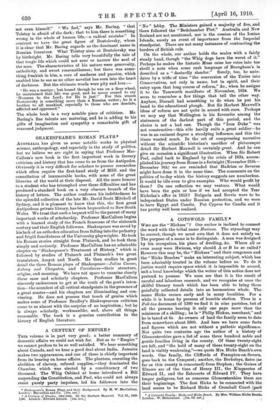A CENT Ur:a OF EMPIRE. j- This volume is in
part very good; a better summary of domestic affairs we could not wish for. But as to "Empire" we cannot profess to be so well satisfied. We hear something about Canada, and we hear a good deal about India. Jamaica makes two appearances, and one of these is chiefly important from its bearing on home affairs. The planters, resenting the abolition of slavery, refused supplies,—they dominated the Chamber, which was elected by a constituency of two thousand. The Whig Cabinet at home introduced a Bill suspending the Constitution, and Peel, who could not always resist purely party impulses, led his followers into the
• Shakespeare's Roman Plays and their Background. By M. W. MacCallum. London ! Macmillan and Co. [10a. net.] t d Century of Empire, 1801-1900. By Sir Herbert Maxwell. Vol. II., 1833- 8, London Edward Arnold. [14e. net.]
" No " lobby. The Ministers gained a majority of five, and there followed the "Bedchamber Plot." Australia and New Zealand are not mentioned, nor is the cession of the Ionian Islands, surely an event of importance from the Imperial standpoint. There are not many instances of contracting the borders of British rule.
On the whole, our author holds the scales with a fairly steady hand, though "the Whig dogs have the worst of it." Perhaps he makes the historic. Muse raise her voice into too shrill a note when some rash language of Brougham's is described as a " dastardly slander," Surely, too, he ante- dates by a trifle of time "the conversion of the Tories into Conservatives, not only in name, but in spirit, and their entry upon that long course of reform," &c., when he assigns it to the Tamworth manifesto of November, 1834. We seem to remember a few things that tell the other way. Anyhow, Disraeli had something to do when he put his hand to the educational plough. But Sir Herbert Maxwell's ideas of reform are not quite in accord with ours. Perhaps we may say that Wellington is his favourite among the statesmen of the darkest part of this period, and the choice is not a bad one. Though the "Iron Duke" was not constructive—this role hardly suits a great soldier—he was in an eminent degree a steadying influence, and this the times wanted much. In the art of compressing narrative without the scientific historian's sacrifice of picturesque detail Sir Herbert Maxwell is certainly great. And he can give on occasion a significant illustration. When Sir Robert Peel, called back to England by the crisis of 1834, accom- plished his journey from Rome in a fortnight (November 25th—
December 9th) we are reminded that Hadrian or Severus might have done it in the same time. The comments on the politics of to-day which the history suggests are numberless.
It would be idle even to give examples. Who would profit by them P On one reflection we may venture. What would have been the gain or loss if we had accepted the Tsar Nicholas's offer in 1853 ? Bulgaria and Servia were to be independent States under• Russian protection, and we were to have Egypt and Candle. Put Cyprus for Candia and it has pretty well been realised.














































 Previous page
Previous page